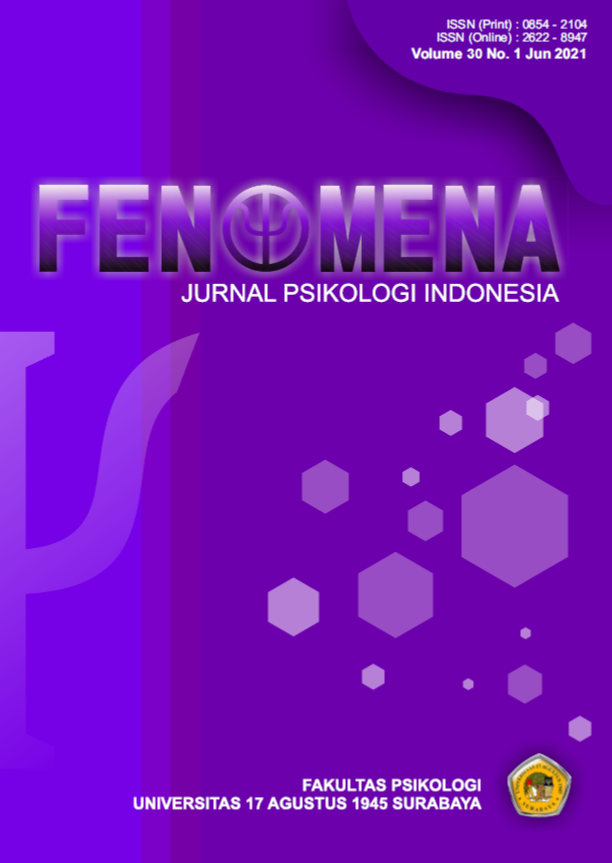Pengaruh Psychological Ownership terhadap Voice Behavior
DOI:
https://doi.org/10.30996/fn.v29i2.4750Abstract
This study aims to determine the direct effect of psychological ownership on voice behavior. The research data obtained by 223 respondents and are employees who work at state-owned companies. The sampling technique used in this study was a combination of accidental sampling and snowball sampling. This study uses a psychological ownership scale adapted from Avey (2009) and a voice behavior scale adapted from Liang (2007). Furthermore, data analysis was performed using the Partial Least Square method. The results of this study indicate that there is a positive and significant direct influence between psychological ownership of voice behavior.
Downloads
References
Ashford, S.J., Sutcliffe, K. and Christianson, M.K. (2009). Speaking Up and Speaking Out: The Leadership Dynamics of Voice in Organizations. Voice and Silence in Organizations, 175-202.
Avey, J. B., Avolio, B. J., Crossley, C.D., dan Luthans, F. (2009). Psychological Ownership: Theoritical Extensions Measurement and relation to Work Outcomes. Journal of Organizational Behaviour, 30, 173-191.
Botero, I. C., dan Van Dyne, L.V. (2009). Employee Voice Behavior Interactive Effectof LMX and Power Distance in the United States and Colombia. Journal Managemen Quarterly, 23, 84-104.
Crant, J. M. (2000). Proactive behavior in organizations. Journal of Management, 26: 435–462.
Greenberg, J., dan Edwards, M.S. (2009). Voice and Silence in Organizations. Bingley, UK: Emerald Group Publishing Limited.
Hair, dkk. (2014). Multivariate Data Analysis, New International Edition. New Jersey : Pearson.
Mayhew, M. G., Ashkanasy, N. M., Tom Bramble, T., dan Gardner, J. (2007). A Study of the Antecedents and Consequences of Psychological Ownership in Organizational Settings. The Journal of Social Psychology,147,477-500.
Miliken, F. J., Morisson, E. W., dan Hewlin, P. F. (2003). An Exploratory Study Of Employee Silence: Issues That Employees Don’t Communicate Upward and Why. Journal of Management Studies, 40, 1453-1476.
Morisson, E. W, dan Miliken, F. J. (2000). Organizational Silence: A Barrier to Change and Development in a Pluralistic World. Academy of Management, 25(4), 706-725.
Morisson, E.W. (2014). Employee Voice and Silence. The Annual Review of Organizational Psychology and Organizational Behaviour, 1,173-197.
Morisson, E. W., See, K. E.,dan Pan, C. (2015). An Approach-Inhibiton Model Of Employee Silence : The Joint Effects Of Personal Sense Of Power And Target Openness. Personnel Psychology, 68, 547-583.
Okuyama, A., Cordula, W. dan Bart, B. (2014). Speaking up for patient safety by hospitalbased health care professionals: a literature review. Osaka, Japan: BioMed Central Service Health Research, 2 (22), 517-536.
Sultana, U. S., Darun, M. R & You, L. (2018). Authentic Leadership and Psychological Capital: A Mingle Effort to Increase Job Satisfaction and Lessen Job Stress. Indian Journal of
(18) (PDF) Pengaruh Work Design Characteristics, Career Growth, dan Psychological Capital Terhadap Work Engagement Karyawan Generasi Milenial di PT. XYZ.
Souba,. Way., Lucey., Sedmak., dan Notestine. (2011). Elephants in academic medicine. Academic Medicine, 86(12), 1492-1499.
Vandewalle, D., Van Dyne, L., dan Kostova, T. (1995). Psychological Ownership: An Empirical Examination Of Its Consequence. Group dan Organisational Management, 20(2), 210-228.
Van Dyne, L., dan LePine, J. A. (1998). Helping and Voice Extra-Role Behavior: Evidence of Construct and Predictive Validity. Academy of Management journal, 41,108–19.
Van Dyne, L., Ang, S., dan Botero, I.C. (2003). Conceptualizing Employee Silence And Employee Voice As Multidimensional Constructs. Journal of Management Studies, 40,1359–1392.
Van Dyne, L., dan Pierce, J. L. (2004). Psychological Ownership And Feelings of Possession: Three Field Studies Predicting Employee Attitudes and Organizational Citizenship Behavior. Journal of Organizational Behavior, 25,439-459.
Whiting, S.W., Podsakoff, P.M., dan Pierce, J.M. (2008). Effects of Task Performance, Helping, Voice, and Organizational Loyalty on Performance Appraisal Ratings. Journal of Applied Psychology, 93, 125–139.
Downloads
Published
Issue
Section
License
Authors retain copyright and grant the journal right of first publication with the work simultaneously licensed under a Creative Commons Attribution 4.0 International License that allows others to share the work with an acknowledgment of the work's authorship and initial publication in this journal.






